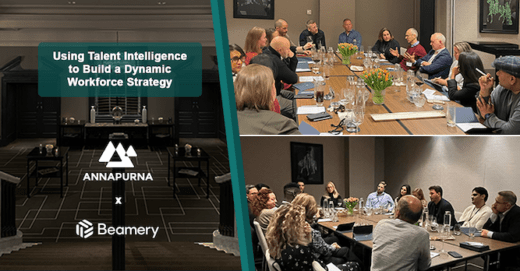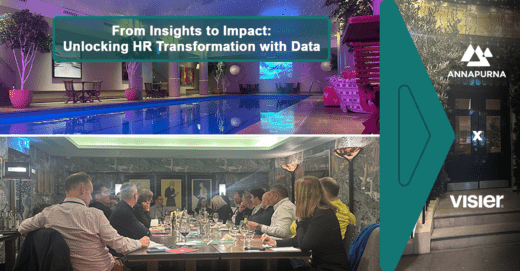The evolution of the use of skills within the talent space is a revolutionary change that is adapting the way we hire, train and use mobility for good.
We were delighted to partner with Eightfold, the industry’s first talent intelligence platform, for a VIP roundtable for People leaders to discuss getting a headstart in the skill-volution.
The conversation was led by James Ballard (Co-Founder at Annapurna) and Daniel Sherer (Account Executive at Eightfold), which brought about the following takeaways:
ROI = Buy-In for HR Tech
Step one of any HR transformation is finding the means to propose an investment.
With global economies struggling, the battle for investment has become more of a challenge, yet the process should not have changed.
The group discussed how many of their successful proposals resulted from the focus on the Return on Investment (ROI). Rather than necessarily looking just at how HR technology can save/make HR money, looking at how HR tech directly impacts business goals (e.g., increased revenue, improved efficiency) brought about wider interest from stakeholders. Framing the HR tech solutions as business solutions, not just HR problems, will secure buy-in from CEOs and CFOs.
Starting with any perceived ‘easy wins’ and a blended approach (combining different technologies) will help to demonstrate value before large-scale investments
The Human Factor in a Tech-Driven Future
AI should be used to support and enable human potential, not replace it.
While technical skills are important, especially for early careers, softer skills like leadership and change management are crucial for senior leaders navigating a changing workforce.
Leaders need to focus on the human aspects of talent development & management as we strive to build future workplaces that are agile, have a desire to learn and can be upskilled.
There was also a very open discussion about some of the concerns around AI bias and privacy, with a specific focus on the importance of communication between the employee and employer. We must ensure that anything we are implementing where we know there may be dissonance among employees is communicated effectively and with the benefits laid out.
As an example, job displacement needs to be addressed to ensure responsible implementation and employees buy-in to the journey.
There was a final point raised about whether AI doesn’t necessarily replace older people (with a wealth of knowledge) but will it replace the entry-level jobs that aren’t necessarily skilled?
The Evolution of HR and Talent Acquisition
Josh Bersin recently introduced a report about Talent Intelligence, as we define it, as the use of massive amounts of employee and workforce data to understand skills, job fit, performance, leadership potential, career pathways, pay equity, and organizational capability. (Full report here)
Talent intelligence (using data to understand employee potential) is becoming a key skill for HR professionals. How do we make sure our leaders are keeping up with this mindset and hiring for potential, not just experience?
Our organisations require a shift in the traditional leader mindset. AI tools can support the mindset with tools to filter “in” for potential and not filter “out” candidates which human bias’ would historically influence.
Whilst AI can automate tasks like interview transcription, the role of judgement, intuition, and this human element remains crucial in talent acquisition.
The importance of striking a balance between technology and human expertise is the future of talent management. There will always be a need for strong leadership and HR capabilities to navigate this evolution.
If you’re interested in seeing how Eightfold‘s all-in-one platform can help you to hire, retain and grow a diverse workforce – faster than ever before, do reach out to them here – https://eightfold.ai/demo/



